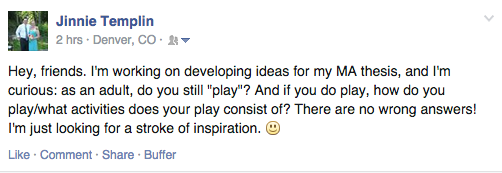I’m reading The Ambiguity of Play by Brian Sutton-Smith this week.
Sutton-Smith describes 7 rhetorics of play. The predominant modern rhetoric is described as “play as progress,” where children’s play (and notedly not typically adult play) is treated as a method of adaptation and development. I reflected on my own discussion of “play” as and adult, and I got curious about how people I know talk about play, so I went to Facebook:

The replies I got were diverse and offered new insight to my research process. Perhaps even more interesting than the types of play people shared was how people talked about their play as adults. Some were sheepish and seemed to “confess” their play habits, while others were eager to share their version(s) of play. A few interesting notes from the comments I got:
- Several comments included questions – primarily seeking to validate whether or not their version(s) of play were “correct.” [I’m not sure if this reaction was because of the phrasing I used to ask the questions, the fact that I mentioned my MA thesis, the Faceboook environment, some combination of those factors and… ?]
- Many of the respondents identified activities that they considered to be children’s activities.
- One friend shared a few comments in the thread. Her final comment included that she felt as though by being asked the questions, she began to think of her “usual activities” in a new light.
- Another friend shared that he and his grad school colleagues had talked at length about the concept of “play” in the professional world. They were focused primarily on how historians “play” with information, so I plan to follow up with him in a private message to pick his brian and see if he has any resources to share.
- Another friend shared this article about an adult playground in Boston to my Facebook wall (but not as a comment to the original post.)
- Another friend private messaged me this article about why it’s important for adults to play.
I was introduced to a method of qualitative research called “phenomenological research” in which researchers examine various topics based on how people perceive their experiences. I don’t think that doing this kind of research would necessarily be all-encompassing, but I do think it may add an interesting spin on the research I’ll be doing, and I plan to find out more about the process of conducting phenomenological research.
